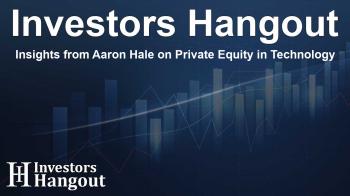Insights from Aaron Hale on Private Equity in Technology

Understanding the Blind Spots in Private Equity
As the landscape of private equity investment continues to evolve, especially in technology and healthcare IT sectors, a fresh perspective is increasingly necessary. Aaron Hale, a prominent figure in the technology industry and a shareholder at LBMC, urges investors and executives to broaden their understanding of value creation in this dynamic market. He emphasizes that while financial diligence plays a vital role, it alone cannot effectively protect enterprise value.
A Broader Perspective
"These are not just minor oversights—these are the critical areas where deals may falter," comments Hale. "To truly lead in this environment, we must expand our viewpoint to encompass regulatory, operational, economic, and cultural aspects. This broader perspective is essential for safeguarding value and generating sustainable returns."
Key Blind Spots in Technology Investment
Hale identifies seven vital topics that private equity leaders often overlook in the tech space, which can significantly impact their investment outcomes.
1. Product–Finance Misalignment
In many high-growth firms, engineering often outpaces financial processes, leading to significant misalignments. Traditional methods of reporting and manual workflows can create distorted valuations, raise revenue recognition concerns, and introduce covenant risks. Relying on outdated spreadsheet technologies can inhibit proper scaling and innovation.
2. Cyber Resilience Over Mere Readiness
While investors typically demand robust cybersecurity policies, they rarely assess recovery capabilities thoroughly. In sectors such as healthcare and software as a service (SaaS), the implications of a security breach can have drastic repercussions that extend beyond mere financial loss.
3. Culture and Leadership Continuity Under Pressure
Following acquisitions, the drain of talent and issues stemming from founder fatigue can pose serious risks to integration processes. It is critical to understand that culture is not simply a soft concept; it is a foundational element that can determine a company’s structural integrity.
4. Healthcare Regulatory Backlash
Laws and regulations concerning private equity in healthcare are becoming more stringent, with increased scrutiny from both state and federal authorities. The evolving regulatory landscape necessitates meticulous planning to mitigate the risks associated with compliance, particularly with new legislations coming into play.
5. Operational Value Over Leverage
As capital costs rise, private equity firms are increasingly focusing on operational efficiency and innovative technologies, such as artificial intelligence, to drive returns. Financial engineering, which was once the cornerstone of value creation, is now often insufficient on its own.
6. Hidden Economic Ripple Risks
Changes in trade policy and geopolitical events create unforeseen impacts on supply chains, cost structures, and growth predictions. It is essential for investors to adopt sophisticated models that account for these ripple effects in their strategic planning.
7. AI Risk & Disclosure Gaps
The rise of generative AI presents both opportunities and risks. However, the lack of precise disclosures can obscure potential pitfalls. With growing attention from regulatory bodies like the SEC, incomplete risk reporting could hinder both diligence processes and exits.
Why This Matters Now
For middle-market CEOs and private equity firms, especially those involved in healthcare IT, SaaS, and tech-enabled services, the current investment climate calls for enhanced diligence and integrated expertise. Hale notes that firms that can effectively align products, talent, and strategies with their financial frameworks will be more adept at navigating uncertainties and seizing exceptional return opportunities.
Frequently Asked Questions
What are the main blind spots identified by Aaron Hale for private equity?
Aaron Hale highlights seven key areas: product-finance misalignment, the importance of cyber resilience, cultural continuity, healthcare regulatory issues, operational versus leverage value, hidden economic risks, and gaps in AI risk disclosure.
Why is financial diligence no longer enough in private equity?
Financial diligence must now be complemented by a comprehensive understanding of regulatory, operational, and cultural factors that influence enterprise value, as these can critically impact investment outcomes.
How does culture affect private equity investments?
Cultural alignment is essential for successful integration post-acquisition. A negative cultural shift can undermine the structural integrity and effectiveness of an organization.
Why is operational value becoming more important?
With rising capital costs, operational efficiency and innovative approaches, such as AI-driven strategies, provide a more sustainable path to delivering returns compared to traditional financial engineering alone.
What potential risks does generative AI introduce?
Generative AI poses various risks, including vague disclosures and the potential for regulatory scrutiny. Investors must be vigilant about comprehensive risk reporting to ensure due diligence is thorough.
About The Author
Contact Addison Perry privately here. Or send an email with ATTN: Addison Perry as the subject to contact@investorshangout.com.
About Investors Hangout
Investors Hangout is a leading online stock forum for financial discussion and learning, offering a wide range of free tools and resources. It draws in traders of all levels, who exchange market knowledge, investigate trading tactics, and keep an eye on industry developments in real time. Featuring financial articles, stock message boards, quotes, charts, company profiles, and live news updates. Through cooperative learning and a wealth of informational resources, it helps users from novices creating their first portfolios to experts honing their techniques. Join Investors Hangout today: https://investorshangout.com/
The content of this article is based on factual, publicly available information and does not represent legal, financial, or investment advice. Investors Hangout does not offer financial advice, and the author is not a licensed financial advisor. Consult a qualified advisor before making any financial or investment decisions based on this article. This article should not be considered advice to purchase, sell, or hold any securities or other investments. If any of the material provided here is inaccurate, please contact us for corrections.

